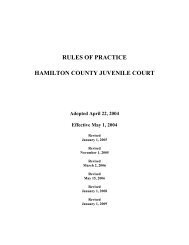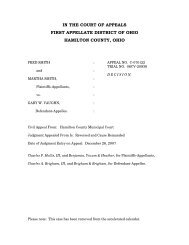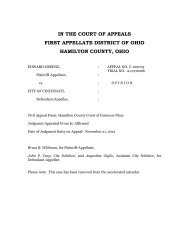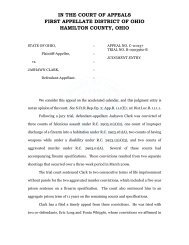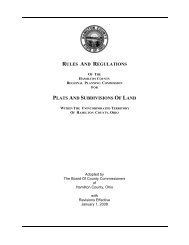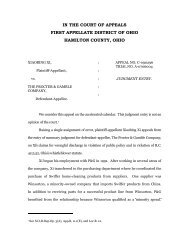State v. Powell - Hamilton County, Ohio
State v. Powell - Hamilton County, Ohio
State v. Powell - Hamilton County, Ohio
- No tags were found...
You also want an ePaper? Increase the reach of your titles
YUMPU automatically turns print PDFs into web optimized ePapers that Google loves.
IN THE COURT OF APPEALSFIRST APPELLATE DISTRICT OF OHIOHAMILTON COUNTY, OHIOSTATE OF OHIO,Plaintiff-Appellee,vs.ANDINO POWELL,Defendant-Appellant.:::::APPEAL NO. C-110530TRIAL NO. B-1007863JUDGMENT ENTRY.We consider this appeal on the accelerated calendar, and this judgment entryis not an opinion of the court. See S.Ct.R.Rep.Op. 3(A); App.R. 11.1(E); 1st Dist.Loc.R. 11.1.1.Andino <strong>Powell</strong> appeals his convictions for murder with a specification andhaving a weapon while under a disability. We conclude that his assignments of errordo not have merit, so we affirm the judgment of the trial court.<strong>Powell</strong> was indicted for two counts of murder with specifications, feloniousassault with specifications, and having a weapon while under a disability. The statealleged that <strong>Powell</strong> had shot and killed Michael Alexander near the Findlay Marketarea of Cincinnati. <strong>Powell</strong> filed a motion to suppress the identification testimony oftwo witnesses. The trial court denied the motion. The murder and felonious-assaultcounts were tried before a jury. At the conclusion of the trial, the jury found <strong>Powell</strong>guilty as charged. Following a bench trial, the trial court found <strong>Powell</strong> guilty ofhaving a weapon while under a disability. The trial court imposed an aggregatesentence of 23 years to life in prison.
OHIO FIRST DISTRICT COURT OF APPEALSIn his first assignment of error, <strong>Powell</strong> asserts that the trial court erred whenit denied <strong>Powell</strong>’s motion to compel and his motion to hold Crim.R. 16unconstitutional. The prosecuting attorney filed a certificate of nondisclosure of twowitnesses pursuant to Crim.R. 16(D). The record indicates that, in accordance withRule 7(K) of the <strong>Hamilton</strong> <strong>County</strong> Rules of Practice of the Court of Common Pleas,the matter was referred to the presiding judge for a review of the prosecutingattorney’s certification. See Crim.R. 16(F). No transcript of the in camera hearingwas provided, so we must presume regularity.See <strong>State</strong> v. Gonzalez, 151 <strong>Ohio</strong>App.3d 160, 2002-<strong>Ohio</strong>-4937, 783 N.E.2d 903 (1st Dist.). We conclude that the trialcourt did not abuse its discretion when it refused to grant <strong>Powell</strong>’s motion to compel.In this assignment, <strong>Powell</strong> also challenges the constitutionality of Crim.R. 16.The state did not violate Maryland v. Brady, 373 U.S. 83, 83 S.Ct. 1194, 10 L.Ed.2d215 (1961). <strong>Powell</strong> did not demonstrate that the state withheld any exculpatoryevidence.Also, the Confrontation Clause of the Sixth Amendment was notimplicated, as <strong>Powell</strong> was not prevented from cross-examining the witnesses.Finally, <strong>Powell</strong> did not demonstrate that his counsel’s effectiveness was diminishedin any way due to the state’s nondisclosure. See Strickland v. Washington, 466 U.S.668, 104 S.Ct. 2052, 80 L.Ed.2d 674 (1984). The first assignment of error isoverruled.Although <strong>Powell</strong>’s second assignment of error states that “[t]he trial courterred by not granting <strong>Powell</strong>’s motion to review the states [sic] certification of nondisclosure,”his argument is directed toward the content of the certification that thestate filed.<strong>Powell</strong> contends that the state’s certificate of nondisclosure did not provideenough information about the reasons for nondisclosure. But we conclude that theprosecuting attorney’s certification of nondisclosure satisfied the requirements ofCrim.R. 16(C). The second assignment of error is overruled.2
OHIO FIRST DISTRICT COURT OF APPEALS<strong>Powell</strong>’s third assignment of error is that the trial court erred when it deniedhis motion to suppress the identification testimony of two witnesses. We note thatthe record does not contain a transcript of the suppression hearing, so we presumeregularity in the hearing. And having reviewed the witnesses’ testimony about theidentification procedures, we conclude that the photograph arrays used in theidentification procedures were not “so impermissibly suggestive as to give rise to avery substantial likelihood of irreparable misidentification.” Neil v. Biggers, 409U.S. 188, 197, 93 S.Ct. 375, 34 L.Ed.2d 401 (1972), citing Simmons v. U.S., 390 U.S.377, 384, 88 S.Ct. 967, 19 L.Ed.2d 1247 (1969). The third assignment of error isoverruled.The fourth assignment of error is that <strong>Powell</strong>’s convictions were against themanifest weight of the evidence. Having reviewed the record, we cannot say that thetriers of fact lost their way and created such a manifest miscarriage of justice that wemust reverse his convictions and order a new trial. See <strong>State</strong> v. Thompkins, 78 <strong>Ohio</strong>St.3d 380, 387, 678 N.E2d 541 (1997). The assignment of error is overruled.In his fifth assignment of error, <strong>Powell</strong> asserts that the trial court erred whenit denied his motion for a mistrial due to prosecutorial misconduct. The state calledDarwin Crutchfield. According to the state, it believed that Crutchfield would testifythat he had been asked to lie by <strong>Powell</strong> about <strong>Powell</strong>’s whereabouts when Alexanderwas shot. After giving some initial testimony, Crutchfield refused to testify. The trialcourt instructed the jury to disregard all of Crutchfield’s testimony, but it denied<strong>Powell</strong>’s motion for a mistrial. We conclude that the trial court’s action in strikingthe testimony of Crutchfield was appropriate, and the trial court did not abuse itsdiscretion when it denied the motion for a mistrial. See <strong>State</strong> v. Sage, 31 <strong>Ohio</strong> St.3d173, 182, 510 N.E.2d 343 (1987). The fifth assignment of error is overruled.In the final assignment of error, <strong>Powell</strong> asserts that the trial court erred whenit refused to instruct the jury that it may consider credible evidence of3
OHIO FIRST DISTRICT COURT OF APPEALSnoncompliance with police policy in determining the credibility of a witness’stestimony about identification from a photographic array. See R.C. 2933.83(C)(3).We conclude that the trial court did not err in refusing to so instruct the jury becausethere was no evidence that police officers had failed to comply with R.C. 2933.83(B)in conducting the identification procedures.The sixth assignment of error isoverruled.Therefore, we affirm the trial court’s judgment.A certified copy of this judgment entry is the mandate, which shall be sent tothe trial court under App.R. 27. Costs shall be taxed under App.R. 24.SUNDERMANN, P.J., HENDON and FISCHER, JJ.To the clerk:Enter upon the journal of the court on August 29, 2012per order of the court ____________________________.Presiding Judge4



